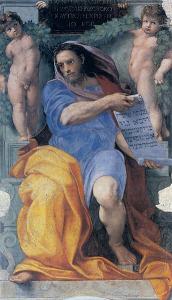Protestants have a quite annoying tendency to select “pet verses” and to ignore many other relevant passages along the same lines. I wrote a whole book about this; one of my own favorites, called The Catholic Verses: 95 Bible Passages That Confound Protestants (Aug. 2004). For example, frequently cite like a mantra, Isaiah 64:6 (which I recently posted about): “all our righteousnesses are as filthy rags” (KJV). They think this proves that (supposedly) no good works are meritorious, that “faith alone” is the way to salvation (which works have nothing to do with), and that sanctification is a separate “optional” category that has nothing to do with salvation, either (which ties in with extrinsic, external, imputed justification). Jeremiah 17:9 is another similar passage interpreted with little or no consideration for context, or of Jeremiah’s overall soteriological thought. I recently examined that passage and Jeremiah’s overall soteriology.
The Protestant idea is that people can do absolutely nothing to be saved and this is because (using these two passages) the heart is utterly “deceitful” and wicked and every righteous act we do is like a filthy rag (literally, a “menstrual rag” in the Hebrew). Accordingly, the Good News Bible paraphrased Isaiah 64:6 in a spectacularly biased and incorrect way: “even our best actions are filthy through and through”. That’s pure Protestantism: particularly the extreme Calvinist view of total depravity.
Catholics fully agree that Pelagianism or works-salvation is a heresy. We disagree with our Protestant brethren that no good works resulting from and caused by grace are meritorious, as the proof of genuine faith, or that none of them can play a role in our ultimate salvation, as the “fruit” of faith or “work of faith” (1 Thess 1:3; 2 Thess 1:11) or “faith working through love” (Gal 5:6) or “good works, which God prepared beforehand, that we should walk in them” (Eph 2:10), as “God’s fellow workers” (1 Cor 3:9), “working together with” God (2 Cor 6:1), and working “harder” as a result of “the grace of God which is with” us (1 Cor 15:10), “abounding in the work of the Lord” (1 Cor 15:58), since “God is at work in” us, “both to will and to work for his good pleasure” (Phil 2:13), etc., etc.
I shall now examine the prophet Isaiah’s overall soteriological teaching, and determine whether it is closer to Catholic or Protestant teaching. All passages are from RSV.
Isaiah teaches that God draws all sinners by His grace, without which no one is, or can be saved, and there are passages hinting at the NT doctrines of justification, faith, grace, and salvation, as well as about God’s love and mercy and forgiveness:
1:18 . . . though your sins are like scarlet, they shall be as white as snow; though they are red like crimson, they shall become like wool.
12:2 “Behold, God is my salvation; I will trust, and will not be afraid; for the LORD GOD is my strength and my song, and he has become my salvation.”
17:10 . . . the God of your salvation, . . .
25:9 . . . This is the LORD; we have waited for him; let us be glad and rejoice in his salvation.
26:3-4 Thou dost keep him in perfect peace, whose mind is stayed on thee, because he trusts in thee. [4] Trust in the LORD for ever, for the LORD GOD is an everlasting rock.
30:15 For thus said the Lord GOD, the Holy One of Israel, “In returning and rest you shall be saved; in quietness and in trust shall be your strength.” . . .
30:18 Therefore the LORD waits to be gracious to you; therefore he exalts himself to show mercy to you. For the LORD is a God of justice; blessed are all those who wait for him.
33:22 For the LORD is our judge, the LORD is our ruler, the LORD is our king; he will save us. (cf. 35:4; 37:20; 38:20)
33:24 . . . the people who dwell there will be forgiven their iniquity.
41:14 . . .your Redeemer is the Holy One of Israel. (cf. 43:1, 14; 44:6, 22-24; 47:4; 48:17, 20; 49:7; 52:9; 54:5, 8; 60:16; 63:9, 16)
43:3 For I am the LORD your God, the Holy One of Israel, your Savior. . . . (cf. 43:11; 45:15)
44:21-22 . . . O Israel, you will not be forgotten by me. [22] I have swept away your transgressions like a cloud, and your sins like mist; . . .
45:21-22 “. . . And there is no other god besides me, a righteous God and a Savior;. . . [22] Turn to me and be saved, all the ends of the earth! For I am God, and there is no other.”
49:6 “. . . I will give you as a light to the nations, that my salvation may reach to the end of the earth.”
49:26 “. . . I am the LORD your Savior, and your Redeemer, the Mighty One of Jacob.” (cf. 60:16)
50:10 . . . trusts in the name of the LORD and relies upon his God?
51:6 . . . my salvation will be for ever, and my deliverance will never be ended. (cf. 51:8)
52:10 . . . the ends of the earth shall see the salvation of our God.
53:11 . . . by his knowledge shall the righteous one, my servant, make many to be accounted righteous; and he shall bear their iniquities.
54:7-8 For a brief moment I forsook you, but with great compassion I will gather you. [8] In overflowing wrath for a moment I hid my face from you, but with everlasting love I will have compassion on you,
55:7 let the wicked forsake his way, and the unrighteous man his thoughts; let him return to the LORD, that he may have mercy on him, and to our God, for he will abundantly pardon.
57:16, 18 . . . nor will I always be angry; . . . [18] I have seen his ways, but I will heal him; I will lead him and requite him with comfort,
60:10 . . . for in my wrath I smote you, but in my favor I have had mercy on you.
61:8 For I the LORD love justice, I hate robbery and wrong; I will faithfully give them their recompense, and I will make an everlasting covenant with them.
61:10 I will greatly rejoice in the LORD, my soul shall exult in my God; for he has clothed me with the garments of salvation, he has covered me with the robe of righteousness, as a bridegroom decks himself with a garland, and as a bride adorns herself with her jewels.
63:7 I will recount the steadfast love of the LORD, the praises of the LORD, according to all that the LORD has granted us, and the great goodness to the house of Israel which he has granted them according to his mercy, according to the abundance of his steadfast love.
Thus far, Catholics and Protestants are in agreement. But Isaiah also regards works — as Catholics do — in necessary conjunction with faith (rejection of “faith alone”):
1:13-17 Bring no more vain offerings; incense is an abomination to me. New moon and sabbath and the calling of assemblies — I cannot endure iniquity and solemn assembly. [14] Your new moons and your appointed feasts my soul hates; they have become a burden to me, I am weary of bearing them. [15] When you spread forth your hands, I will hide my eyes from you; even though you make many prayers, I will not listen; your hands are full of blood. [16] Wash yourselves; make yourselves clean; remove the evil of your doings from before my eyes; cease to do evil, [17] learn to do good; seek justice, correct oppression; defend the fatherless,
plead for the widow.1:21, 23, 26-27 “How the faithful city has become a harlot, she that was full of justice! Righteousness lodged in her, but now murderers. [23] . . . They do not defend the fatherless, and the widow’s cause does not come to them. . . . [26] . . . Afterward you shall be called the city of righteousness, the faithful city.” [27] Zion shall be redeemed by justice, and those in her who repent, by righteousness.
16:5 then a throne will be established in steadfast love and on it will sit in faithfulness in the tent of David one who judges and seeks justice and is swift to do righteousness.”
26:2 Open the gates, that the righteous nation which keeps faith may enter in.
26:12 O LORD, thou wilt ordain peace for us, thou hast wrought for us all our works.
32:17 And the effect of righteousness will be peace, and the result of righteousness, quietness and trust for ever.
38:2-3 Then Hezeki’ah turned his face to the wall, and prayed to the LORD, [3] and said, “Remember now, O LORD, I beseech thee, how I have walked before thee in faithfulness and with a whole heart, and have done what is good in thy sight.” . . .
64:5 Thou meetest him that joyfully works righteousness, those that remember thee in thy ways. . . .
Isaiah teaches the NT and Catholic doctrine of grace, works, and faith all being involved in the process of salvation (see fifty passages from Paul about this). But he also proclaims the biblical and Catholic doctrine of good, meritorious works and obedience to God’s law and moral commands playing a central role in God’s determination of every person’s ultimate salvation or damnation (see fifty passages about that, too):
1:19-20 “If you are willing and obedient, you shall eat the good of the land; [20] But if you refuse and rebel, you shall be devoured by the sword; for the mouth of the LORD has spoken.”
3:10-11 Tell the righteous that it shall be well with them, for they shall eat the fruit of their deeds. [11] Woe to the wicked! It shall be ill with him, for what his hands have done shall be done to him.
10:1-3 Woe to those who decree iniquitous decrees, and the writers who keep writing oppression, [2] to turn aside the needy from justice and to rob the poor of my people of their right, that widows may be their spoil, and that they may make the fatherless their prey! [3] What will you do on the day of punishment, in the storm which will come from afar? To whom will you flee for help, and where will you leave your wealth?
29:20 . . . all who watch to do evil shall be cut off,
33:15-16 He who walks righteously and speaks uprightly, who despises the gain of oppressions, who shakes his hands, lest they hold a bribe, who stops his ears from hearing of bloodshed and shuts his eyes from looking upon evil, [16] he will dwell on the heights; his place of defense will be the fortresses of rocks; his bread will be given him, his water will be sure.
48:18-19 O that you had hearkened to my commandments! Then your peace would have been like a river, and your righteousness like the waves of the sea; [19] your offspring would have been like the sand, and your descendants like its grains; their name would never be cut off or destroyed from before me.”
56:1-2 Thus says the LORD: “Keep justice, and do righteousness, for soon my salvation will come, and my deliverance be revealed. [2] Blessed is the man who does this, and the son of man who holds it fast, who keeps the sabbath, not profaning it,
and keeps his hand from doing any evil.”57:1-2 . . . For the righteous man is taken away from calamity, [2] he enters into peace; they rest in their beds who walk in their uprightness.
59:2 but your iniquities have made a separation between you and your God, and your sins have hid his face from you so that he does not hear.
59:11-12, 18 . . . we look for justice, but there is none; for salvation, but it is far from us. [12] For our transgressions are multiplied before thee, and our sins testify against us; for our transgressions are with us, and we know our iniquities: . . . [18] According to their deeds, so will he repay, . . .
65:7 “. . . because they burned incense upon the mountains and reviled me upon the hills, I will measure into their bosom payment for their former doings.”
***
***
Photo credit: The Prophet Isaiah (1511-1512), by Raphael (1483-1520) [public domain / Wikimedia Commons]
***
Summary: I examined the book of Isaiah, in order to determine the prophet’s soteriology (theology of salvation). Lo and behold, it’s very Catholic and quite unProtestant.














